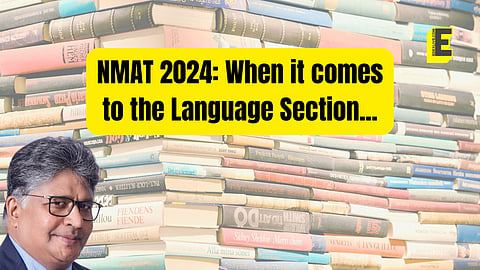

The Language Skills section assesses candidates’ verbal abilities, reading comprehension, and other English language skills. This section contains 36 questions, and candidates have 28 minutes to complete it. Key topics include paragraph formation, sentence completion, error identification, and reading comprehension, with a focus on vocabulary, grammar, and reading comprehension.
Strategies for success
To excel in this highly competitive exam, candidates can employ various strategies. Here are some effective tips for mastering the Language Skills section:
1. Practice regularly
Consistent practice is essential for success in any competitive exam. Even those proficient in English must practice regularly to achieve high scores in the language section. Remember this golden maxim: “Practice makes perfect.”
2. Learn words in chunks
Words often occur together in groups, known as ‘word chunks.’ A strong vocabulary is built by learning words in these chunks. Examples include: fast food, quick lunch, heavy rain, strong wind, take a rest, and make a decision. Constant exposure to English through listening, reading, speaking, and writing helps you use these chunks accurately.
3. Understand Grammar Concepts
Familiarity with grammar does not require memorising rules. Instead, focus on using correct forms in communication. Here are some essential concepts:
Subject-Verb Agreement: A singular subject takes a singular verb, while a plural subject takes a plural verb. For example: He/She eats, They/We eat, One of my friends is coming to meet me today.
Consistency with Tenses: Avoid mixing tenses within sentences. For example: "He said he ate a pizza last night and it was tasty."
Correct Article Usage: Know when to use ‘a’ and ‘an.’ Use 'a' before words starting with a consonant sound and 'an' before words starting with a vowel sound. For example: a one-rupee coin, an MP.
Correct Prepositions: Mastering prepositions comes with exposure to the language. Familiarise yourself with compound prepositions such as: in relation to, with regard to, and in addition to.
Proper Punctuation: Correct punctuation is crucial for conveying your message accurately. Missing punctuation, like a comma, can change a sentence's meaning. For instance: Let’s eat, Grandpa vs Let’s eat Grandpa.
Variety of Sentence Structures: Familiarity with different sentence structures enhances comprehension and error identification in reading passages.
Parallel Structures: Understanding parallelism improves clarity. For example: John and Mary, along with their kids, visited us this morning, shared their travel experiences, and presented us with gifts; we watched a movie at a nearby cinema and enjoyed dinner at our favorite restaurant.
(Dr Albert P’Rayan is an ELT resource person and education columnist. Views expressed are his own. He can be reached at rayanal@yahoo.co.uk.)
